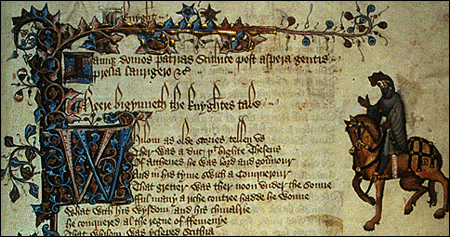The Canterbury Tales

The Squire is one of the thirty pilgrims travelling on a pilgrimage to the Shrine of
St. Thomas a' Becket in Canterbury in The Canterbury Tales. He is the
twenty-year-old son of the Knight, and he is described in contrast to his father, as
"a lovere and a lusty bacheler" (Norton, 83). He may become more mature
and more like his father, but that will have to come with age.
His hair is curled, as though it had been set, which tells us that he is more concerned
about his appearance than his father is. He also wears stylish but daring clothing - a
short gown with long, wide sleeves--and this is equal in modern times in shock value to a
miniskirt. In stature he is of average height, and he is also very active with great
strength.
The Squire was apprenticed to a knight before he could become a knight, and this is the
reason why he is "curteis, lowely and servisable, and carf biforn his father at the
table" (Norton, 83). He has ridden for sometime with the cavalry, and the
places that he went to were Flanders, Artois, and Picardy. He places importance on
fighting for his lady's honor, which is unlike his father, who fights for theoretical
ideals or God.
Chaucer compares him to the description of spring at the very beginning of the
"General Prologue". His clothes are embroidered like a meadow, "al ful of
fresshe flowres, white and rede," and "he was as fressh as is the month of
May" (Norton, 83).
The squire is also a happy person, which is good for a person of his age, and he also has
many talents, such as making songs and words come together. He also has many hobbies,
which are another part of his talents, and they are jousting, dancing, sketching and
writing. Since he is so young, and has such high spirits and energy, he sleeps
"namore than dooth a nightingale" (Norton, 83).
In summary, the Squire is a good character who one day will make a fine knight and make
his father proud. He is not only young, strong, and in love; he is courteous, eager to
serve, and perfect for his type, even though it may be a bit different than his father's.
The squire gets the greatest compliment from the Franklin who wishes his own son were more
Squire-like.
This page is created by Gerald
Paradine
BACK
Back to top
